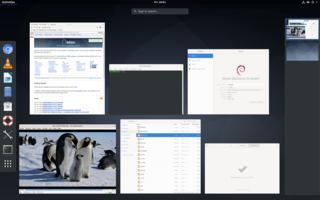
Debian, also known as Debian GNU/Linux, is a Linux distribution composed of free and open-source software, developed by the community-supported Debian Project, which was established by Ian Murdock on August 16, 1993. The first version of Debian (0.01) was released on September 15, 1993, and its first stable version (1.1) was released on June 17, 1996. The Debian Stable branch is the most popular edition for personal computers and servers. Debian is also the basis for many other distributions, most notably Ubuntu.

GNU nano is a text editor for Unix-like computing systems or operating environments using a command line interface. It emulates the Pico text editor, part of the Pine email client, and also provides additional functionality. Unlike Pico, nano is licensed under the GNU General Public License (GPL). Released as free software by Chris Allegretta in 1999, nano became part of the GNU Project in 2001.

XEmacs is a graphical- and console-based text editor which runs on almost any Unix-like operating system as well as Microsoft Windows. XEmacs is a fork, based on a version of GNU Emacs from the late 1980s. Any user can download, use, and modify XEmacs as free software available under the GNU General Public License version 2 or any later version.

GNU Privacy Guard is a free-software replacement for Symantec's PGP cryptographic software suite. It is compliant with RFC 4880, the IETF standards-track specification of OpenPGP. Modern versions of PGP are interoperable with GnuPG and other OpenPGP-compliant systems.
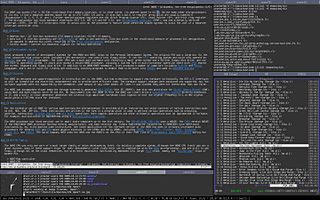
In Unix computing, Ion is a tiling and tabbing window manager for the X Window System. It is designed such that it is possible to manage windows using only a keyboard, without needing a mouse. It is the successor of PWM and is written by the same author, Tuomo Valkonen. Since the first release of Ion in the summer 2000, similar alternative window management ideas have begun to show in other new window managers: Larswm, ratpoison, StumpWM, wmii, xmonad and dwm.

Lunar Linux is an operating system maintained around a source-based package management system also called Lunar. The project is a descendant of the Sorcerer Linux distribution.
GNU Aspell, usually called just Aspell, is a free software spell checker designed to replace Ispell. It is the standard spell checker for the GNU operating system. It also compiles for other Unix-like operating systems and Windows. The main program is licensed under the GNU Lesser General Public License, the documentation under the GNU Free Documentation License. Dictionaries for it are available for about 70 languages. The primary maintainer is Kevin Atkinson.
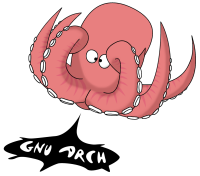
GNU arch software is a distributed revision control system that is part of the GNU Project and licensed under the GNU General Public License. It is used to keep track of the changes made to a source tree and to help programmers combine and otherwise manipulate changes made by multiple people or at different times.

GnuTLS is a free software implementation of the TLS, SSL and DTLS protocols. It offers an application programming interface (API) for applications to enable secure communication over the network transport layer, as well as interfaces to access X.509, PKCS #12, OpenPGP and other structures.

GNU Radio is a free software development toolkit that provides signal processing blocks to implement software-defined radios and signal-processing systems. It can be used with external RF hardware to create software-defined radios, or without hardware in a simulation-like environment. It is widely used in hobbyist, academic, and commercial environments to support both wireless communications research and real-world radio systems.
Technical variations of Linux distributions include support for different hardware devices and systems or software package configurations. Organisational differences may be motivated by historical reasons. Other criteria include security, including how quickly security upgrades are available; ease of package management; and number of packages available.

GNU Bazaar is a distributed and client–server revision control system sponsored by Canonical.

GNU IceCat, formerly known as GNU IceWeasel, is a free software rebranding of the Mozilla Firefox web browser distributed by the GNU Project. It is compatible with Linux, Windows, Android and macOS.
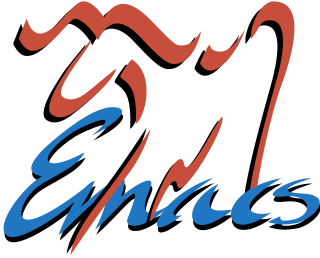
GNU Emacs is a free software text editor. It was created by GNU Project founder Richard Stallman. In common with other varieties of Emacs, GNU Emacs is extensible using a Turing complete programming language. GNU Emacs has been called "the most powerful text editor available today". With proper support from the underlying system, GNU Emacs is able to display files in multiple character sets, and has been able to simultaneously display most human languages since at least 1999. Throughout its history, GNU Emacs has been a central component of the GNU project, and a flagship of the free software movement. GNU Emacs is sometimes abbreviated as GNUMACS, especially to differentiate it from other EMACS variants. The tag line for GNU Emacs is "the extensible self-documenting text editor".

GNOME is a free and open-source desktop environment for Unix-like operating systems. GNOME was originally an acronym for GNU Network Object Model Environment, but the acronym was dropped because it no longer reflected the vision of the GNOME project.

Uzbl is a free and open-source minimalist web browser designed for simplicity and adherence to the Unix philosophy. Development began in early 2009 and is still considered in alpha software by the developers. The core component of Uzbl is written in C, but other languages are also used, most notably Python. All parts of the Uzbl project are released as free software under the GNU General Public License version 3.

AwesomeWM is a dynamic window manager for the X Window System developed in the C and Lua programming languages. Lua is also used for configuring and extending the window manager. Its development began as a fork of dwm. It aims to be extremely small and fast, yet extensively customizable. It makes it possible for the user to manage windows with the use of keyboard.

Chakra is a Linux distribution originally based on Arch Linux and focused on KDE software, intending to provide a KDE/Qt minimizing use of other widget toolkits where possible. It has been well-received by critics.
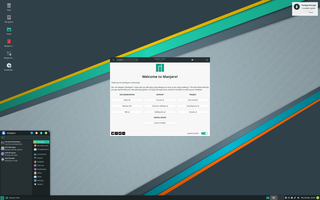
Manjaro is a free and open-source Linux distribution based on the Arch Linux operating system. Manjaro has a focus on user-friendliness and accessibility, and the system itself is designed to work fully "straight out of the box" with its variety of pre-installed software. It features a rolling release update model and uses Pacman as its package manager.

















